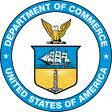United States Department of Commerce

United States Department of Commerce: Staff Publications
Date of this Version
2011
Abstract
Cetacean morbilliviruses (CeMV) are viruses that can cause mass mortalities among various odontocete species. In this study levels of “herd” immunity in cetaceans from the U.S. coast are described from the distribution and prevalence of antibodies against morbilliviruses. Neutralizing antibody titers against dolphin morbillivirus (DMV), porpoise morbillivirus (PMV), phocine distemper (PDV), and canine distemper viruses (CDV) were measured. Positive samples had higher titers against the CeMV than against the other morbilliviruses tested, indicating that although PDV or CDV can be used to investigate exposure their use may result in a higher false negative rate. The results suggest that morbillivirus did not persist in coastal populations of bottlenose dolphins (Tursiops truncatus) after the major outbreaks that occurred in the 1980s and 1990s. Bottlenose dolphins from Beaufort, North Carolina; St. Joseph Bay, Florida; and Cape May, New Jersey had anti-DMV seroprevalences ranging from between 15% and 33% but those from Charleston, South Carolina and Sarasota Bay, Florida, sampled in recent years were largely negative. These latter groups are therefore now vulnerable to infection and could experience high mortality if exposed to CeMV. Sero-surveys of this kind are therefore vital for assessing the risk of new and recurring viral outbreaks in coastal cetaceans.


Comments
Published in MARINE MAMMAL SCIENCE (2011) 27(1): 1–19; DOI: 10.1111/j.1748-7692.2010.00393.x